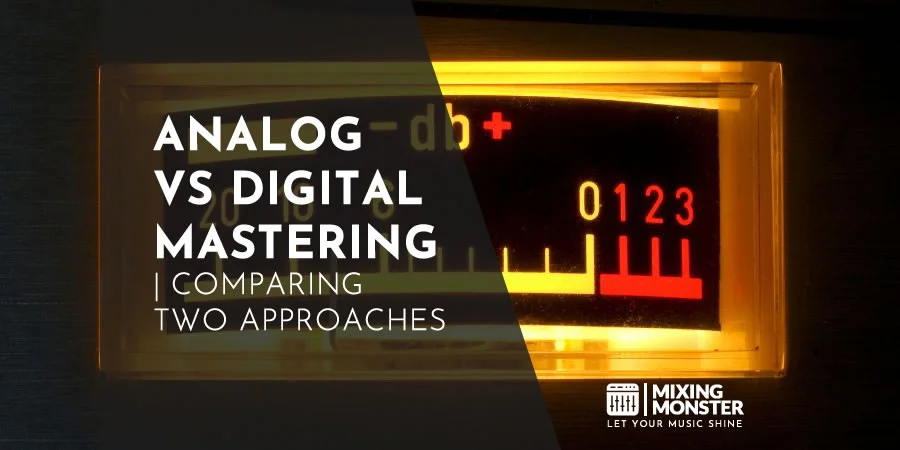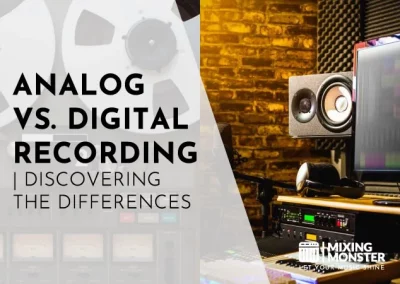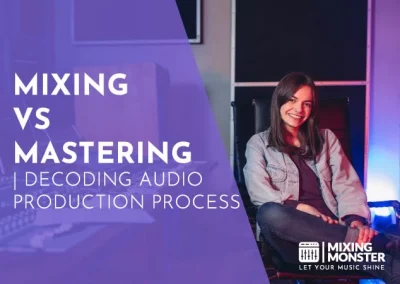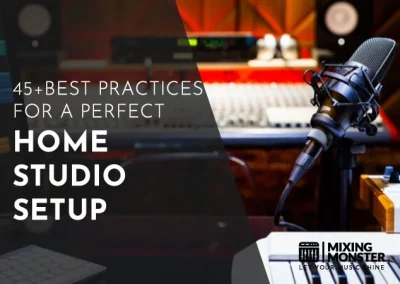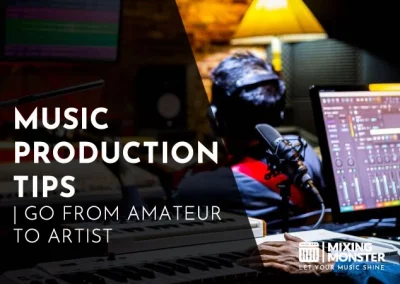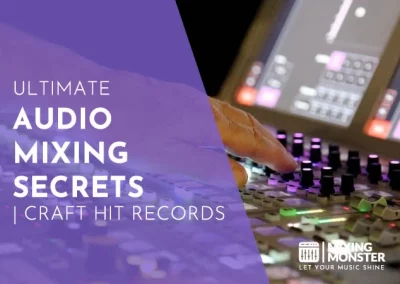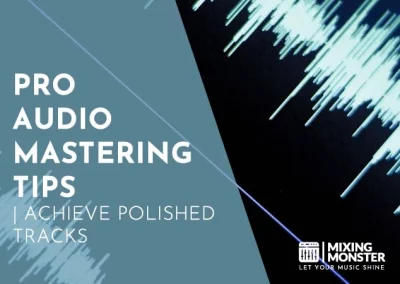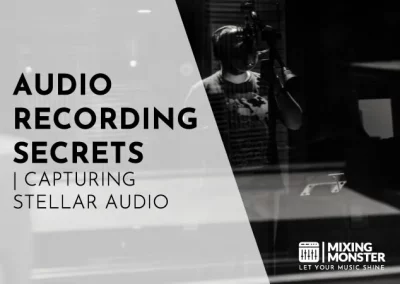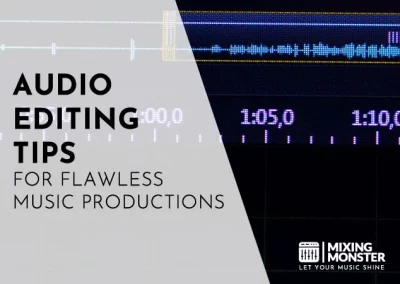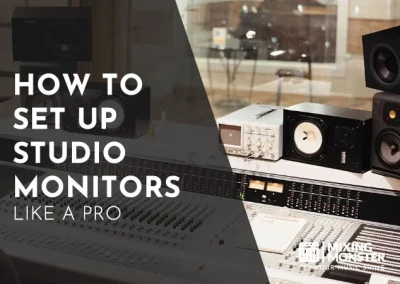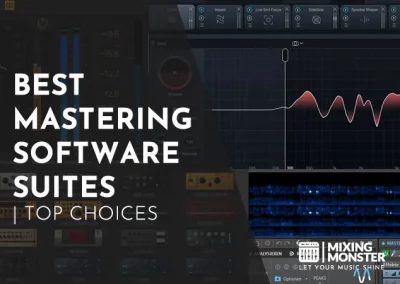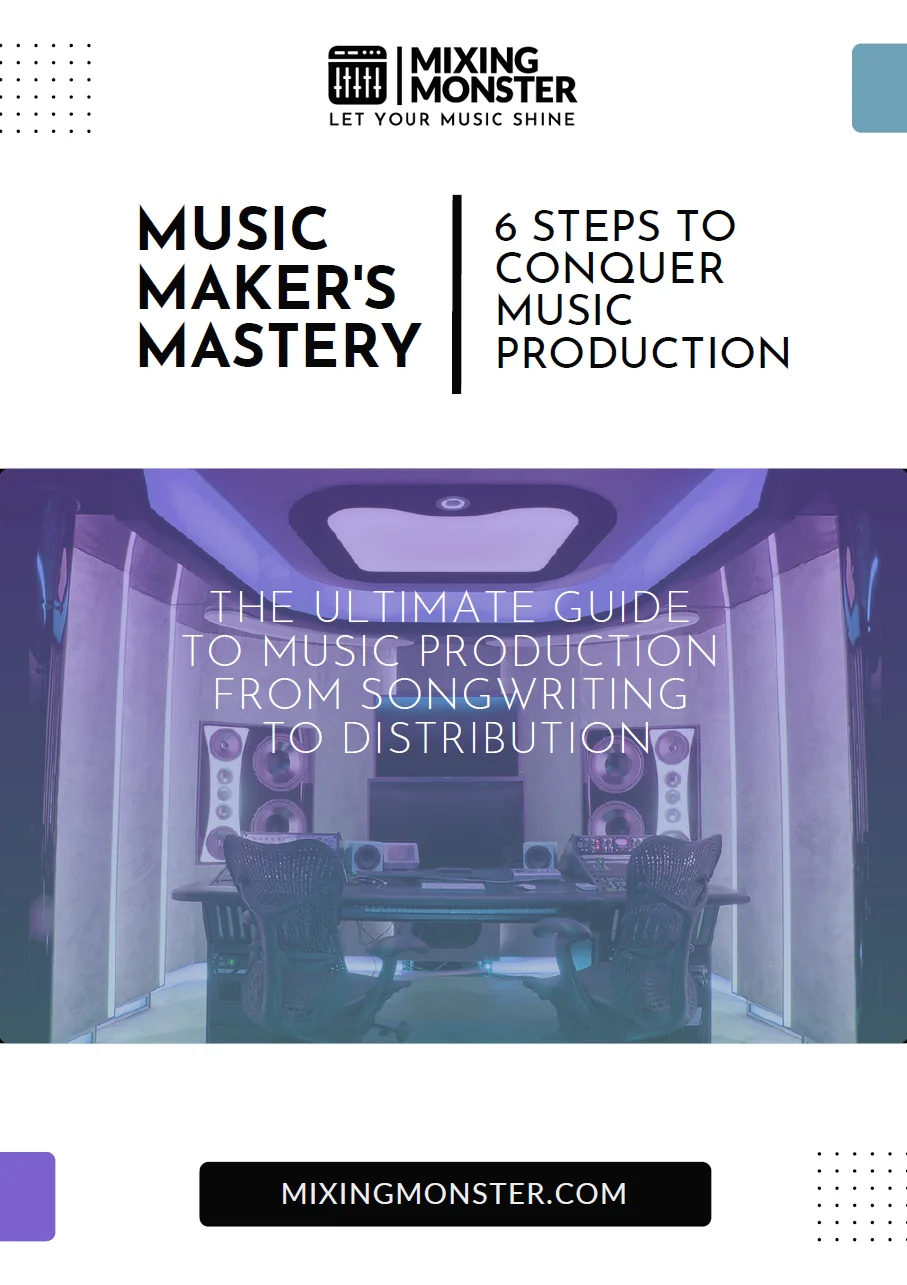Home > Blog > Studio Gear > Mastering Gear
Disclosure: Some of the links below are affiliate links, meaning that at no additional cost to you, we will receive a commission if you click through and make a purchase. Read our full affiliate disclosure here.
Mastering is the final step in producing audio content, and the choice between analog and digital mastering can significantly influence the quality and texture of your final audio product. Facing this decision, understanding the distinctions between analog and digital mastering is essential to achieve the sound that matches your artistic vision.
Analog vs digital mastering revolves around the technology and processes for finalizing audio tracks. Analog mastering utilizes physical equipment like tape machines and outboard gear to process the sound, resulting in subtle harmonic distortions and a ‘warm’ sound signature. Conversely, digital mastering is performed with software, offering pristine clarity, surgical precision, and the convenience of recalls and edits.
This topic will equip you with a deeper understanding of mastering nuances and how to tailor them to your needs. Whether you lean towards the rich, full-bodied character of analog mastering or the crisp, detailed precision that digital mastering can offer, comprehending their differences is paramount. This knowledge makes making a well-informed decision for your music more manageable and more creatively fulfilling.
KEY TAKEAWAYS:
- Mastering is a critical phase in audio production, impacting the final sound.
- Analog mastering imparts warmth; digital mastering offers precision.
- Understanding both mastering forms is key to informed decision-making.
Table Of Contents
1. Fundamentals Of Audio Mastering
2. Analog Mastering Explained
3. Digital Mastering Explained
4. Comparing Analog Vs Digital Mastering
5. Hybrid Mastering Techniques
6. Final Thoughts On Analog Vs Digital Mastering Choices
7. FAQ

1. Fundamentals Of Audio Mastering
Before diving into the intricacies of audio mastering, understand that this final step in production is where your track acquires its polish and commercial sound quality. It’s crucial to grasp its purpose and the general flow of the process.
The Purpose Of Audio Mastering
Audio mastering serves as the bridge between the creative process of mixing and the distribution of your music. The goal is to ensure uniformity and consistency across your entire album or single.
During mastering, sound engineers apply specific EQ adjustments to enhance sound quality, add depth, and ensure that the track translates well across various playback systems. Warmth and character may also be imparted to the sound, often sought after in analog mastering.
Mastering Process Overview
The mastering process involves a series of steps, each critical to the song’s final sound. Initially, a mastering engineer examines the final mix’s EQ settings to balance the tonal spectrum and correct any distortion that could diminish clarity.
Then, compressors and limiters are employed to uniformly control dynamics without squashing the life out of the track. Essential to mastering is also setting the track’s loudness to industry standards, which ensures your music competes well in the marketplace and provides a consistent listening experience.
2. Analog Mastering Explained
In this section, you’ll explore the distinctive qualities of analog mastering, the essential gear for this process, and the benefits this traditional approach can offer your music.
Characteristics Of Analog Mastering
Analog mastering uses physical hardware to enhance and finalize audio recordings. It’s known for adding a warm, rich, and sometimes described as vintage sound quality, resulting from subtle harmonics introduced by the analog equipment.
These characteristics are often sought to achieve a depth and emotional feel, perceived as less clinical than their digital counterparts.
Analog Mastering Gear And Equipment
Critical pieces of analog gear include:
- Tape Machines:
Imbue tracks with characteristic warmth and compresses sound musically pleasingly. - Transformers And Tubes:
Add depth and character through their inherent nonlinearities. - Equalizers And Compressors (Analog Hardware):
Allow for hands-on, tactile control, providing sometimes more intuitive adjustments than digital plugins.
Benefits Of Analog Mastering
The benefits of using analog mastering are distinct:
- Sound Quality:
Achieve a signature sound perceived as warmer and more three-dimensional. - Physical Interactions:
The tactile nature of physical knobs and faders can lead to more organic changes in sound. - Artistic Character:
Utilizing analog mastering can impart a timeless character to the music, often described as vintage or classic.
Analog mastering offers an irreplaceable experience and sonic flavor that many engineers and artists prefer despite the conveniences of digital alternatives.
3. Digital Mastering Explained
Digital mastering harnesses the precision and flexibility of technology to enhance the clarity of your music. In this section, you’ll discover how tools and techniques distinct to the digital realm contribute to a polished final product.
Characteristics Of Digital Mastering
Digital mastering is a non-tangible, software-based approach to refining audio recordings. It grants you unparalleled precision in manipulating sound thanks to a vast array of digital plugins and tools.
The clarity of the audio is heightened, as digital tools allow for minute adjustments that are both precise and easily reversible—something that analog equipment cannot always offer.
When mastering digitally, you work within a Digital Audio Workstation (DAW), where the audio exists as digital audio files.
Digital Mastering Tools And Software
Your DAW is the fundamental software environment where digital mastering takes place. Within it, you can employ a variety of digital plugins that simulate traditional mastering hardware—these range from equalizers and compressors to limiters and spatial imaging tools.
Converters also play a crucial role in digital mastering; they translate analog signals into digital data and vice versa, ensuring that the audio does not lose fidelity during mastering.
- Key Digital Mastering Software:
- Pro Tools
- Logic Pro
- Ableton Live
- Steinberg Cubase
- Popular Plugins For Mastering:
- iZotope Ozone
- FabFilter Pro-Q 3
- Waves L2 Ultramaximizer
Benefits Of Digital Mastering
Choosing to master your recordings digitally brings a host of advantages. You experience a significant gain in convenience as you have all your tools available at a click, without the need for physical rack space or equipment.
Furthermore, with digital mastering, you benefit from restorability; you can save and revisit projects with all their settings intact. The option for automation allows for dynamic processing over time, giving you creative control that melds precision with artistic expression.
4. Comparing Analog Vs Digital Mastering
Before diving into the specifics, understand that analog and digital mastering hinges on the quality and authenticity you seek, the efficiency and flow of your mastering workflow, and the cost implications tied to your budget.
Mastering Quality And Authenticity
Analog mastering is synonymous with a warmth and sonic character many find irreplaceable. It’s often praised for adding depth and life to music, creating a richer listening experience.
Nonetheless, digital mastering can provide crystal clear clarity and precision, excelling in capturing intricate detail without introducing noise.
| Quality Aspect | Analog | Digital |
|---|---|---|
| Authenticity | Unique warmth, depth | Highly accurate reproduction |
| Sonic Character | Organic, nonlinear | Clean, linear |
| Detail | Natural harmonics | Precision in digital clarity |
Mastering Workflow And Efficiency
Your workflow can be markedly different depending on which method you choose. Analog mastering requires real hardware and can be less flexible, necessitating a more static workflow.
In contrast, digital mastering harnesses software that allows instant recall of settings, a boon for efficiency and quick changes. Here, flexibility is a noticeable advantage.
| Workflow Factor | Analog | Digital |
|---|---|---|
| Setup Flexibility | Fixed signal chain | Fully customizable signal chain |
| Recallability | Manual setup replication needed | Instant project recall |
| Physical Space | Requires physical rack space | Only needs computer space |
Mastering Cost Implications
When examining the cost, analog equipment typically requires a significant upfront investment, possibly limiting its accessibility if you work with a tight budget. Conversely, digital mastering tools can be acquired at a fraction of the cost. Most digital plugins and software offer a more cost-effective solution, enabling great-sounding results without breaking the bank.
| Cost Factor | Analog | Digital |
|---|---|---|
| Upfront Expense | High, due to equipment purchase and maintenance | Lower, often only need software purchases |
| Long-term Value | Lasting equipment with potential resale value | Software updates and potential upgrades |
| Accessibility | May be limited by budget constraints | Widely accessible, even for home studios |
Throughout these comparisons, your choice may often come down to personal preference and the specific needs of your project.

5. Hybrid Mastering Techniques
Hybrid mastering takes the best of both worlds—utilizing the warmth and richness of analog equipment with the precision and flexibility of digital tools for mastering specific music projects.
Advantages Of Combining Analog And Digital Mastering
When you employ hybrid mastering, you can leverage the distinct characteristics of analog and digital processes.
Analog gear, such as an analog compressor, delivers a certain sonic warmth and character that can sometimes be missing in the digital realm. This warmth is especially valued in specific music genres where a more organic sound is a priority.
On the other hand, digital compression and other digital tools allow for a level of detail and surgical precision that is hard to achieve with analog hardware alone.
- Sonic Benefits:
Incorporating analog hardware can produce a more pleasing harmonic distortion that many listeners find musical and engaging. - Flexibility And Precision:
Digital tools offer easy recall for adjustments and precise editing capabilities.
Hybrid Mastering Setup
Your hybrid mastering setup merges physical hardware units with software-based processing. This involves routing your digital audio through quality analog equipment and reverting the processed audio into the digital domain.
This way, you can apply fine-tuned digital effects post-analog processing, maintaining workflow efficiency.
- Signal Flow:
Digital audio out → Analog gear → Digital audio in - Toolset Combination:
Use analog for broad strokes and digital for detailed tweaks.
Combining both methods allows you to balance the tactile feel and unique sound-shaping capabilities of analog processing with the recallability and extensive functionality of digital systems.
This hybrid approach is about choosing the right tool for the job and getting the benefits of both analog and digital to suit your mastering needs effectively.
6. Final Thoughts On Analog Vs Digital Mastering Choices
As you approach the crossroads of analog and digital mastering in the music industry, understanding the intrinsic values of each method is crucial. To refine your music’s final sound, this choice holds significant importance.
Making Informed, Mastering Decisions
When determining your path in mastering analog equipment or utilizing digital technology, the choice should be guided by each system’s distinctive advantages and disadvantages.
In the realm of analog, warmth, and character are often attributed to its sound signature—a result of its subtle harmonic distortions. However, analog can be less forgiving with errors and typically involves a higher cost in terms of equipment and maintenance.
Conversely, digital mastering provides precision and recall, making it easier to achieve consistent results across different sessions. This method offers a limitless palette for audio manipulation, stemming from the constant technological advancements.
Yet, it’s worth noting that some engineers believe digital lacks the unique coloration that analog equipment can impart to a mix.
- Advantages Of Analog:
- Unique warmth and tonal character
- Physical interaction with the gear
- Disadvantages Of Analog:
- Higher initial and maintenance costs
- Reduced flexibility in recalling settings
- Advantages Of Digital:
- Precision and consistency
- Cost-effectiveness and portability
- Disadvantages Of Digital:
- Potential for over-clinical sound
- Perceived lack of warmth by some
Analog Vs Digital Mastering: Choose The Best Of Both Worlds
Contemporary mastering engineers often don’t confine themselves to one realm. Instead, they harness the best of both worlds, merging analog’s warmth with digital’s flexibility.
You could utilize digital precision for initial edits and surgical fixes, while analog processors add the desired character to your masters.
This hybrid approach uniquely allows you to tailor the mastering process to each project. By aligning technology with the needs of your music, you’re equipped to make informed decisions that best serve your artistic vision.
Remember that the truth lies in the sound—what ultimately benefits the music is paramount, transcending any preference for one technology over the other.
Happy mastering!
7. FAQ
1) What are the fundamental differences between analog and digital mastering?
Analog mastering relies on physical equipment to process your music, adding unique warmth and color to the sound. Digital mastering, on the other hand, uses computer software and digital processors, providing precision and consistency in the final product.
2) How can the choice between analog and digital affect the final sound of a mastered recording?
Choosing between analog and digital mastering affects dynamic range, frequency response, and overall tonal character. Analog mastering can enhance the warmth and depth, whereas digital mastering offers a clean, transparent sound.
3) What are the specific advantages of using analog equipment for mastering?
Analog equipment often imparts a characteristic harmonic distortion that can yield a perceived warmth and richness to the sound, which some artists and listeners prefer.
4) In what scenarios might digital mastering be preferable over analog?
Digital mastering may be preferable when consistency, recallability, and efficiency are important. Its precision allows for meticulous editing and is often more affordable and accessible.
5) How does the result of a digital master compare to an analog master?
The result of a digital master can be cleaner and more precise, while an analog master may provide a more organic feel with subtle harmonic enhancements. Both methods aim for commercial loudness and clarity across various playback systems.
6) Can you provide examples of how a song's genre or production style might influence the decision to use analog or digital mastering methods?
Acoustic or vintage genres may benefit from the warmth of analog mastering, while electronic or pop genres could leverage the precise control of digital mastering to achieve a polished sound.

